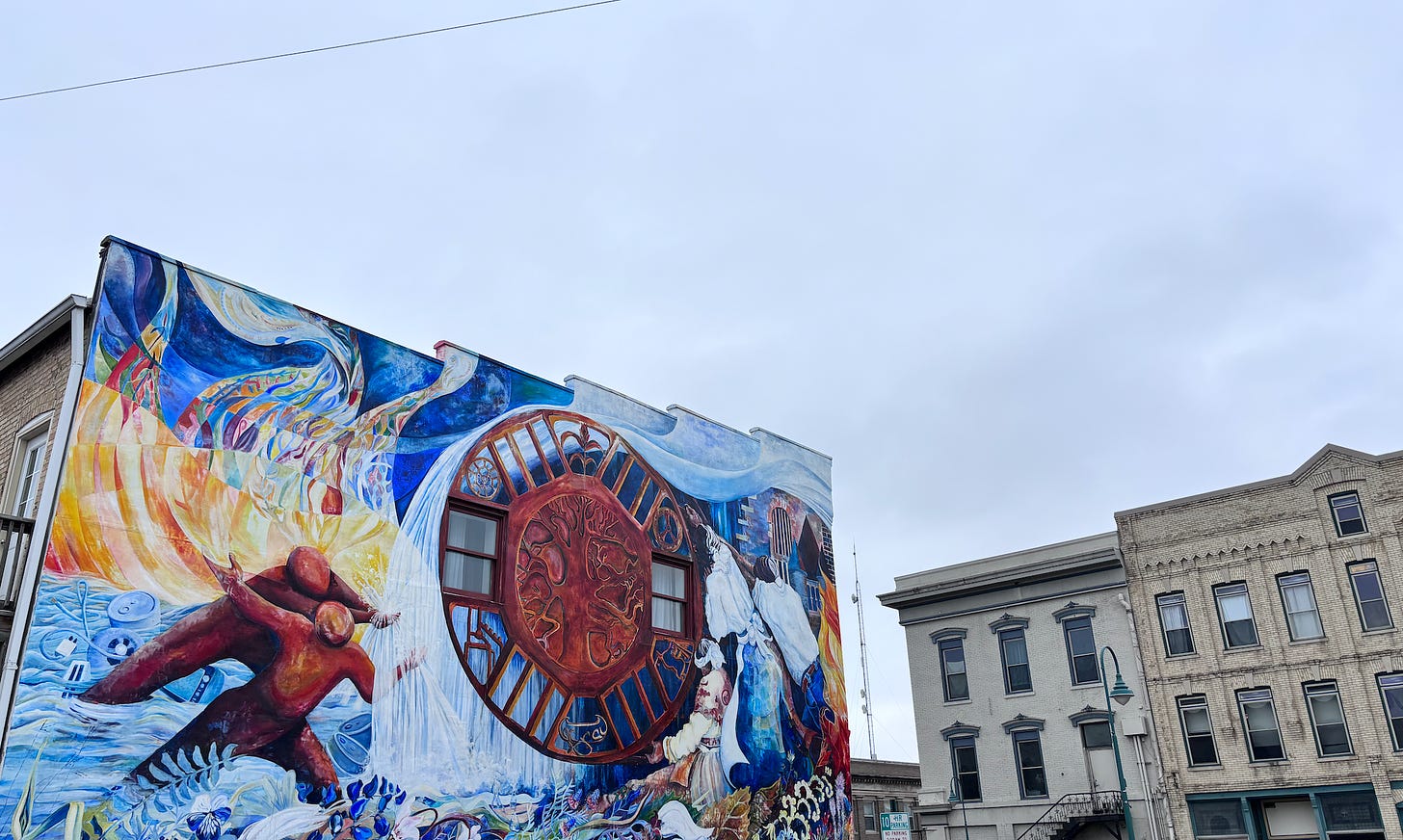Even if you’ve never visited Whitewater, Wisconsin, if you’ve spent any time in the non-metropolitan Midwest, you already know what Whitewater feels like. It’s a college town, but not in the bohemian gentrified sense. It is dominated by a large regional university, a former teacher’s college known outside the region primarily for its powerhouse Division III football program, but there are also factories, farms, schools, parks, a clean, orderly Walmart and everything else you’d expect in a city of 14,000 people. The central business district is neither depressed and boarded up nor self-consciously quaint and precious. Chicagoans don’t flock there for summer vacation, as is the case in nearby Lake Geneva, but it has also never served as a poster child of Rust Belt decay and depression. That is, until last week.
If you aren’t an avid consumer of conservative media, you may have missed the news that Whitewater is dying. The culprit? Joseph Robinette Biden Jr. The cause of death? A flood.
That headline and photo comes courtesy of Breitbart, the formerly Steve Bannon-helmed website/racism factory. It is an example of a very specific variety of journalism called “lying.” While that image would lead you to believe otherwise, Joe Biden’s smirking, disembodied head did not personally oversee the transport of a thousand migrants to Walworth County in a single border patrol van.
Now it is true that roughly 1000 recent immigrants, most of them from Central and South America, have moved to Whitewater since 2020. They have largely done so not because of any coastal elitist plot to disrupt business as usual in the heartland, but because that’s how migration patterns have always worked. First wave migrants find jobs and opportunity in an area, making it more likely for relatives and others in their social networks to join them.
Whitewater found its way into conservative outrage crosshairs due to a letter sent by its police chief and city manager to the White House requesting additional financial resources to better welcome and accommodate its newest residents. It’s a fairly banal request, focused largely on the need for more municipal translation services. The letter takes great strides to not demonize its new residents, noting local government’s responsibility for the fact that many new arrivals live in substandard housing, are not being served properly by city schools and don’t trust local law enforcement. Per city manager John Weidl, “the central theme of the letter [was] that everybody in Whitewater deserves the basic services that the city provides to everyone, whether that be clean water, police and fire, parks and recreation, library books. Everyone deserves that.”
It isn’t surprising that a relatively innocuous request for resources was spun so cravenly. The Whitewater story has all the ingredients for a Great Replacement theory fever dream. First, start with the town, which could be any White town, which could be your White town. Then, build out the threat: Immigrants, presumably Brown and Spanish-speaking, arriving in significant-sounding numbers. 1000 of them. In a small town? One where even the water is white? Can you imagine? Sprinkle in a few cherry-picked phrases from the original letter (“great strain,” “serious crimes,” “acute… humanitarian issue”) and let White American imaginations to do the rest. What does it all add up to? An invasion.
This is all evil, of course. Awful and dehumanizing and patently racist. It’s an open and shut case. I could end the newsletter right here, smugly content in having done my duty as a leftist fact checker. What’s notable about the rhetoric in these Breitbart and Fox News pieces, though, isn’t what they have to say about the Venezuelan and Nicaraguan migrants they’re demonizing. It’s how they tell the story of Whitewater, the “small town” under attack.
In these stories, Whitewater is a place where the American dream died long before it welcomed in new migrants. It was already, in Breitbart’s imagining, a deeply impoverished place, crime-ridden and buckling under the strain of a housing crisis. The article cites statistics to back up its case, though it omits the context that poverty and arrest rates are likely to be skewed in a town of 14,000 that is home to a 12,000 student university. The article isn’t interested in facts, though. It’s got a story to tell. Its most visceral claim doesn’t even warrant a citation, namely that, in Whitewater, “Biden’s migrants will drive up housing costs, push down wages, and take jobs from the locals who are older, alienated, sicker, or damaged by drugs.”
This is the point that leftist critiques of conservative immigration canards often miss. We properly identify the racism and vilification of a foreign other, but we fail to recognize that the (White) communities being “invaded” aren’t depicted as utopias either. Breitbart wants you to imagine that Whitewater could be your community, not because it’s idyllic and Rockwellian, but because it’s in crisis, home primarily to the sick, the alienated, the elderly and the drug-addicted.
The point of news cycles like this is to reinforce the idea that everybody is suffering everywhere, but if you are the audience for conservative media and you’re feeling left out by the global economy or national and local politics, liberals and leftists don’t care about you, they only care about immigrants.
I drove to Whitewater yesterday. It wasn’t my first trip. My wife’s grandparents are buried in a cozy hillside cemetery overlooking Cravath Lake. As I expected, it felt largely unchanged from my last visit. There wasn’t anybody out on the streets, but that didn’t surprise me, given that this was a cold Wisconsin January day and UW-Whitewater students are still on winter break. There are a few signs— Spanish language flyers, a few new Central American and Mexican grocery stores— that once homogenous Whitewater is slowly becoming more pluralistic. There are no indications, of course, of zombified, drug-addled White townies battling busloads of new migrants for access to affordable housing. Most of my conversations were with twenty-something gas station clerks at the well-appointed Caseys and Kwik Trips on either side of town. Whitewater’s fine, I heard.
Mine was not a rigorous anthropological visit. I just wanted to ensure that I wasn’t hastily dismissing any telltale signs of a rust belt community spiraling downward— commercial vacancies, boarded up homes, trash-strewn streets. The fact that I didn’t find those signifiers doesn’t categorically disprove Breitbart’s tale of woe, but that wasn’t the point.
Had I had more time and curiosity, I have no doubt that I would have run into plenty of folks— native-born Americans and recent immigrants, students and townies, young and old— who are struggling. I know that not because Whitewater is uniquely down on its heels, but because it is an American community and every American place is home to folks who are struggling. Our personal sense of alienation and well-being has very little do with macro-economic indicators or the relative level of vacancies on our town’s Main Street. UW-Whitewater may have a shiny student union, but there’s a reason why there’s a food pantry inside. We are all wracked— in large ways and smalls, even those of us cocooned by societal privileges but especially those who aren’t— by the compounded stress of a country that has never fully cared for all its residents.
It’s that reason— not merely old-fashioned racism and xenophobia, but the nagging feeling that if the U.S. government doesn’t give a damn about you, they must be giving a damn about somebody else instead— that makes anti-immigration appeals so seductive. That’s why conservatives always ramp them up towards election time. That’s why they are growing increasingly resonant not just in White communities but in Black and Brown communities as well.
So yes, there’s a need, an urgent need in fact, to rebut every bad faith, racist attack soon to be lobbed during the 2024 election cycle. But if that’s where our politics stop— with a smug fact check and a wave of a finger— we’re going to lose, not merely elections but also the hope of building a better country.
That’s why I was so struck by the beauty and simplicity of that message from the Whitewater city manager.
“Everybody in Whitewater deserves the basic services that the city provides to everyone, whether that be clean water, police and fire, parks and recreation, library books. Everyone deserves that.”
Everyone deserves that.
The leftist reply to divide-and-conquer strategies can’t merely be “you need to care more about people who aren’t like you” but “we all need to care about all of us.” And that doesn’t mean that we need to cede ground to false equivalence. We can still acknowledge disproportionality of oppression. We can still make the point that there is geopolitical context as to why so many people are fleeing places like Nicaragua right now. But we can do so while still holding tight to a politics that believes that every resident of Whitewater Wisconsin deserves a decent, affordable place to live, a job with dignity, safety without police terror, and schools that love their children. Everyone. Including a new resident from Nicaragua, of course, but also including all those who read and share Breitbart articles.
The point of divide and conquer politics is to stretch us apart from one another. The antidote doesn’t live in counterpoints. It comes in stitching all of us back together. And that doesn’t just mean encouraging others to stretch out their hands in every direction, it’s making sure that ours too are extended without reservation.
End notes:
Song of the week: “Divide and Conquer” by Hüsker Dü. On the nose, yes. But still!
It's not about my politics
Something happened way too quick
A bunch of men who played it sick
They divide, conquer
As always, the song of the week playlist is on both Apple Music and Spotify.
In other news: Are you tired of updates about the platform that hosts this newsletter and their willingness (or lack thereof) to adopt basic content moderation standards for Nazis and White supremacists? Me too! There was some positive news on that front this week, though. Thanks to the organizing efforts of hundreds of writers, Substack has removed an initial batch of Nazi publications from the platform (something it previously resisted doing so, on free speech absolutionist terms). Here’s what I wrote about it.
While I don’t pretend that move is sufficient, this initial organizing victory reaffirms my belief that it’s both important (and strategic, given our potential leverage together) for justice loving publications to not cede this space yet. That may still change in the future, but for now I’m still here, still bugging Substack and trying to make my decisions with the principles of collective action in mind. I will note that I’m in active contact with a number of other writers who’ve been vocal on this issue and we’ve all been hemorrhaging paid subscribers (largely because our readership is composed of amazing, principled folks who have felt icky about Substack’s heel dragging). I wouldn’t trade readers like that for the world. The tricky thing is, this is our livelihood.That’s to say, if you are in a position to support this or other publications you value, this is a meaningful moment to do so, And if you want to support this space but want a non-Substack means of doing so, know that I will comp memberships for folks who donate to Barnraisers or pre-order The Right Kind Of White. All this is still evolving, so while I’m already tired of writing about this subject, if anything does change, either on Substack or my side, you all will be the first to know. Love y’all!








As a Whitewater native, I appreciate this piece. I haven't lived there in over 10 years, but the description and feeling ring so true. Even when I was in high school in the late 90s, we were having assemblies about "cultural awareness" in order to prevent fighting between groups of students of different cultures (specifically white and Latin-o/a/x). And yet, Whitewater remains standing.
I’m here. Will continue supporting the work you do.